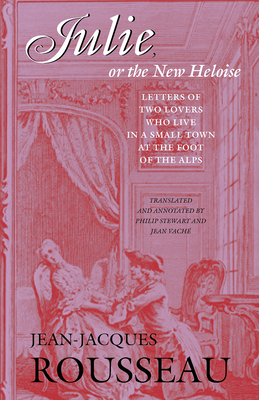Scan barcode
1001 Books You Must Read Before You Die - hosted by cdhotwing
Julie; or, the New Eloise – Jean-Jacques Rousseau
Lifespan | b. 1712 (Switzerland), d. 1778 (France) First Published | 1760 First Published by | Duchesne (Paris) Original Title | Julie; ou, la nouvelle Héloïse
Julie, Jean-Jacques Rousseau’s first novel, is modeled on the medieval story of Eloise, and the forbidden love between herself and her tutor, Abelard. Yet in Julie, Rousseau transforms secrecy and sinfulness into renunciation and redemption, in which it is the pupil and not the master who makes the central claim on our attention. Julie’s relationship with her teacher, Saint-Preux, reformulates the twelfth-century conflict between bodily desire and religious purpose into a characteristically eighteenth-century study of right behavior. In this epistolary novel, Rousseau links the classical tradition of civic virtue with its Enlightenment counterpart of domestic order and the new birth of individual feeling, which was to eventually culminate in the Romantic movement. As befits this apparently paradoxical transition, the thematic structure of Julie is both rigorous and odd. In the first half, Julie alternately resists and is consumed by Saint-Preux’s passion, which leads to his banishment from her father’s house. By the second half, he has returned to the new estate formed by Julie and her husband, Wolmar, where all three happily co-exist in the cultivation of both mind and landscape. In this static Elysium, the dangerous desires of the novel’s first part are ethically recapitulated. For readers, this allegorical mirroring of virtue and desire makes Julie’s triumph somewhat suspect. However, the irreducibility of the problem makes the difficulty of Rousseau’s novel a persistently contemporary one. DT
All books added
760 pages • first pub 1760 (editions)
ISBN/UID: 9780874518252
Format: Paperback
Language: English
Publisher: Dartmouth College Press
Publication date: 01 October 1997
fiction
classics
philosophy
reflective
medium-paced
fiction
classics
philosophy
reflective
medium-paced
760 pages • first pub 1760 (editions)
ISBN/UID: 9780874518252
Format: Paperback
Language: English
Publisher: Dartmouth College Press
Publication date: 01 October 1997
fiction
classics
philosophy
reflective
medium-paced
fiction
classics
philosophy
reflective
medium-paced
More...
